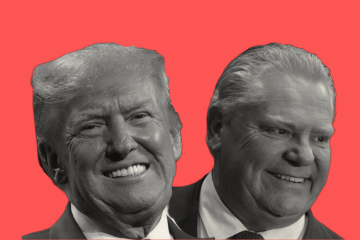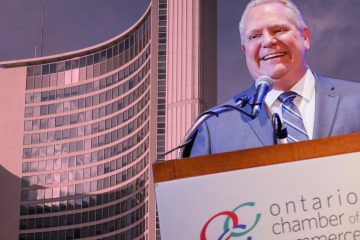The Toronto Committee of the Communist Party of Canada reaffirms its condemnation of restrictive, anti-worker, and anti-democratic legislation being considered by Toronto City Council. To protect the gains won by labour and progressive movements, we call on Council to reject any measures which seek to restrict the democratic rights of the working class, and we urge all in the labour and people’s movements to fight and reject any restrictions.
At its May 21, 2025 meeting, Toronto City Council will be presented with a by-law proposal from City of Toronto staff which would create so-called “community safety zones,” more popularly known as “bubble zones,” in the City of Toronto. This comes after the December 18, 2024 City Council meeting, where a supermajority of Council, including Mayor Olivia Chow, directed staff to develop the by-law.
If passed at its May meeting, this bubble-zone by-law would impose vast restrictions on the right to free speech and free assembly in the city. While the text of the proposed by-law is not yet public knowledge, debate at Council’s December 18 meeting indicated it would likely take inspiration from a series of other, similarly restrictive by-laws which have been implemented across the country. In particular, Council cited a by-law passed by Vaughan City Council which places 100m restrictions around particular institutions, including places of worship, schools, and daycare centres.
So-called “nuisance” protests are restricted from occurring within the 100m bubbles around these institutions, with nuisance being described as anything which is likely—intended or not—to cause someone to feel intimidated. This is a broad and far-reaching definition which allows its scope to cover any and all forms of demonstration. Worse yet, the by-law in Vaughan gives Council the power to directly adjudicate what a nuisance is and what, in their view, could become one, giving them the political authority to directly shut down all speech which is politically inconvenient to them. If Toronto is looking to Vaughan as the blueprint, we can expect similarly repressive and expansive measures brought in here.
City of Toronto staff have given signals that they are developing a by-law which is even more expansive in scope, indicating through their public consultation process that they are hoping to restrict demonstrations around even more sites, including cultural institutions like art galleries, post-secondary schools, community centres, and more. This was revealed through a digital survey component of their public consultation—a process which has been widely condemned, including by the labour movement and organizations like the Canadian Civil Liberties Association. The flawed process saw staff and Council receive so much public outrage, an urgent motion was brought forward at its April meeting to review public consultation processes for all by-laws going forward.
This is not the first time a by-law of this type has been proposed in Toronto, with discussions occurring at several Council meetings, and another motion coming forward in April/May 2024 to ask the province to impose a similar by-law. After intervention from the labour and people’s movements, these were all defeated.
So it was to some surprise, including to some Councillors, that recommendation of a by-law was brought back by staff—with some on Council even questioning whether it was in order to do so. The City’s bureaucracy bringing forward a by-law unprompted like this has led to questions about whether or not lobbying influence is at play, and serves as a potent reminder of the urgent need to remove wealthy lobbyists and corporate forces from the political process.
The forces lobbying for restrictions to speech like this do so against the backdrop of nearly two years of sustained protests calling to an end to the ongoing genocide in Palestine. These uprisings for peace have occurred across the country, and indeed the world, and have been particularly strong in Toronto, with the city seeing rallies in the tens of thousands in solidarity with the Palestinian people.
Overwhelmingly, despite vicious attacks from corporate, right-wing, and Zionist forces, the Palestine solidarity protests in the city have been lawful—and widely supported by working people. It is because of the lawful nature of the protests that repressive forces on Council seek to expand the law’s scope, as their current toolkit leaves them unable to totally suppress popular sentiments in support of Palestine and its people, despite every effort on their part to do so. Not coincidentally, this by-law would de facto ban protests at sites of some of the most frequent demonstrations, including the offices of several sitting MPs who have seen regular protests against their support of the genocide.
Expanding state repression of working people must be understood beyond the scope of just Palestine solidarity. For several years, labour and the people’s movements have been increasing their fightback against declining living standards and for social change, with the growing Palestine solidarity movement an extension of those other struggles. Indeed, the labour movement in particular has seen a resurgence in militancy in the recent period, with strike activity in 2023 and 2024 reflecting multi-decade highs.
This by-law must then be seen as a natural continuation of the repression faced by the labour movement, through both legislative and extra-legislative means, at the hands of all levels of government. This includes the use of section 107 of the labour code by the federal Liberals to break up several high-profile strikes, including the recent use against CUPW workers at Canada Post; the use of the notwithstanding clause by Doug Ford to end the strike undertaken by OSBCU workers in 2022; and the recent escalation of police intervention in lawful strikes and pickets, including the brutalization and arrest of striking CUPE 3903 workers in 2023 in Toronto.
It should come as no surprise then, that during motivations for a similar by-law in February 2024, Toronto City Councillor James Pasternak cited his desire to restrict trade unions’ ability to negotiate as part of his motivation for such a by-law. In particular, he cited a bargaining rally organized by healthcare workers affiliated with the Ontario Coalition of Hospital Unions (OCHU) as something he would like to restrict, reiterating several times over Council’s two-day session that he would like to see the union’s ability to “take the street” taken away.
The massive expansion of repression of dissent which is occurring just south of the border in the United States should be a chilling reminder of where restrictive by-laws like this can lead. Now, Liberal Leader Mark Carney has indicated one of the first tasks of his administration will be to impose similarly restrictive legislation across the country, making such protests a criminal offence, further eroding bourgeois democratic norms in Canada.
Notably, beyond just the far-right, we are seeing both liberal and social democratic parties signal their support of these oppressive by-laws and legislation. As the labour and the people’s movements continue to grow their fightback, these restrictions—and support for them from bourgeois parties—will only continue to grow, making the need to build forces of opposition now all the more urgent.
In order to continue the struggles for peace, for real democracy, and for an economy which serves working people, all those who struggle in the labour and people’s movements must urgently turn our attention to building a unified struggle in defence—and for expansion—of civil and democratic rights in the city and the country.
The Toronto Committee of the Communist Party of Canada calls on Toronto City Council to totally reject this anti-democratic by-law, and we call on all in the labour and people’s movements to mobilize to defend our democratic and labour rights.
Toronto Committee, Communist Party of Canada



